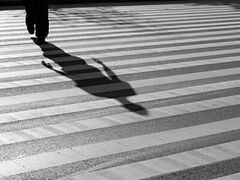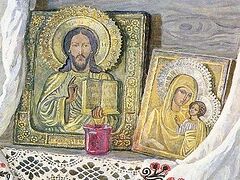Tuesday morning. By tradition we hold a service of intercession for the sick in our chapel in the village just across the street from the hospital on this day. I usually come right before the beginning of the service, put on my vestments, bless those present and begin to serve. Then some ask me to hear their confessions. I give Communion to patients or just talk with people.
That morning I was asked to celebrate a memorial litia. I turned on the hot plate, took out some charcoal from the box and put it on the coil. While I was waiting for the charcoal to light, a girl of about ten came up to me and touched my sleeve.
“A man outside is calling you,” she pointed her finger towards the front door.
“A man is calling me? Why doesn't he come in?”
The girl shrugged her little shoulders.
“I don’t know. He’s calling.”
I went outside and saw a short, thin, elderly man of about sixty-five. He was standing on the path that leads to the chapel, clasping a large wooden icon case with both hands and clutching it to his chest. His face seemed familiar to me. I recalled that I often saw him digging through the dumpsters, collecting empty cans of beer and energy drinks. An oversized jacket, clearly picked up from a trash heap, and an equally worn-out coat made him look like a bum.
Passing the trash heap and seeing him sorting through the contents of garbage bags, I always greeted him and continued on without stopping. Tearing himself away from his work, he would look in my direction and screw up his half-blind eyes, struggling to figure out who the man who had just greeted him was. He did all this as if in slow motion—due to his sluggishness he didn’t have time to greet me in return.
His sluggishness amused me. I recalled the story told me by a young man I know. He is responsible for the selection and cultivation of special varieties of potatoes used for making potato chips for a famous company. At one time, he had to travel a lot around Europe to find the right material. Norway was one of the countries he visited. He recounted, “Together with our driver and interpreter, who happened to also be Russian, we drove into a local village. Moving slowly along the main street, we drove up to one house. An old Norwegian man was sitting on a bench beside it and smoking a pipe. The driver pulled up in front of the old man, rolled down the window and said something in Norwegian very politely. In response, the old man rose from his seat, put his hand to his chest and bowed. The driver rolled the window back up and we drove on.
“‘What did you say to him?’
“‘I greeted him and gave him Mr. Johansen’s regards.’
“‘You mean you and he have common acquaintances?’
“‘Of course not! That was the first time I’ve ever seen him.’
“‘Then how do you know that the old gentleman knows a certain Mr. Johansen who sends him regards regularly?’
“‘I don’t know anything! Here, every other person is named either Johansen or Andersen. This is how I amuse myself and get rid of my boredom. They are awfully slow-witted, and now this gentleman will think about who I am and which Mr. Johansen asked to be remembered to him all day long.’
“‘Why bother?’
“‘I don’t know,’ he shrugged his shoulders. ‘I already told you, out of boredom.’”
It was that Norwegian gentleman that this can collector reminded me of. I continued to say hello to him each time without any particular intention, although I referred to him as none other than “Johansen” in my own thoughts.
***
“Hello,” said the can collector, noticeably worried. “Here’s an icon for you. I found it in a trash heap. But it’s damaged and needs to be fixed.”
Alcoholics used to bring us small icons or metal crosses in exchange for alcohol. This time too I expected him to say, “Would you mind giving me some church wine to help with my hangover?” I didn’t remember ever seeing him drunk, though. But what next? For some reason he had brought me the icon.
He handed the icon to me without saying a word. I nodded inquiringly and asked:
“What, then?”
“Nothing,” the man said, turned and walked away. I followed him with my eyes and felt ashamed.
We restored the icon. It was a large icon of the Savior painted in an old-fashioned style. Now it hangs in the sanctuary in a renovated case. I didn’t see the old man for a long time after that memorable day. Both the icon and its case had already been restored, but I still couldn’t apologize for the conversation and thank the donor.
One day as I was walking through the village I ran right into him. The man was surprised:
“An icon? I don’t remember. I didn’t give you anything. You’d better tell me if this is a sin for me or not. I go to trash heaps to pick empty beer cans. What don’t I find there! Crosses, spiritual books, various icons… People throw icons into the garbage! I find them and take them home. Do you know how many of them I have?! Sometimes I find church prosphora. They are very dry, not moldy. I have no idea what I should do with them. I can’t leave them in the garbage. At home I soak them in holy water and eat them. Is it a sin? Is it a sin that I eat them?”
“A sin? No, it’s not a sin.”
“And what’s a sin?”
I pointed to his fingers, yellow from tobacco and said:
“Voluntarily poisoning yourself with tobacco day in and day out—that’s a sin. Eating prosphora isn’t a sin. Thank you for doing this.”
***
Half a year passed, maybe even a year. One of our parishioners called me and asked me to come visit someone who was seriously ill.
“Father, he is already just skin and bones. I hope he’s able to receive Communion and Unction in time. He believes in God, in his own way, and he is a very good person. He said you knew him. He was touched that you had confused him with someone.”
I agreed to go and give Communion to the sick man. We agreed on a day when I could do it. Then I received calls again to change the time because the man was taken to the hospital every now and then. In the end, I met with the man a month after my acquaintance had phoned me.
I went up to the fourth floor and approached the door indicated, which was slightly open. I opened the door myself without ringing and saw old “Johansen.” He looked much worse, had grown quite thin. His eyes looked just as they did before, squinting slightly. And there were no nicotine stains left on his fingers.
He saw me gazing at his fingers and said:
“I have smoked as long as I can remember. You said it was a sin and I gave up smoking. You see, now my fingers are absolutely clean.”
I looked around. The hallway had no wallpaper. “Johansen” complained that he was going to make some repairs and had torn off the old wallpaper, but now he didn’t have enough strength to hang up the new wallpaper.
He invited me to the room. We prayed together. I gave him Unction, then heard his confession and gave him Communion.
“For the past few years I’ve been collecting empty cans and scrapping them. I could survive without doing it—I get a pension and my children support me; but I collected them all the same. At first I was sorry because it was metal and it needs to be recycled. So much work is invested in it, and it is wasted! Once the cans piled up, I would take them to the recycling center. I would receive money and go to a nearby church. I bought large candles and put them onto all the candle-stands, one in front of each saint. I would put the remaining money into a donation box for the poor and was happy that I could help someone. Now let’s go to the kitchen and I’ll show you how many ‘saints’ I’ve got.”
In the kitchen, one corner and the wall opposite the sink with a gas stove were covered with icons from the top down to the level of the table. Among them were some old icons in cases; but most of them were small—from very tiny to the size of a piece of notebook paper.
“Here I pray. How do I pray? Sometimes with a prayer book, but mostly in my own words, and I talk to the saints. I inherited these icons from my parents. These ones I bought myself, and I found the others in the garbage. People throw icons away. They don’t need them. You can’t imagine how many icons I’ve brought to my garage! I pray for those who throw icons away and I ask the saints not to take offense at them. It’s all foolishness and thoughtlessness that causes them to do it. They live like little children and are unaware of what they’re doing. I feel pity for them.
“I have been thinking lately that I’ll die soon. But who will correct their mistakes in my place?”
He stopped talking. Then he took a small icon with the image of some holy monk from the shelf. Time had erased the inscription on it.
“Look! It’s old. Silver-plated printing. When I turn on the light in the evening, it sparkles all over! It was lying near a dumpster. The sun illuminated it and I saw it. It’s my favorite one. Take it from me as a keepsake.
“And now,” he opened the kitchen cabinet and took out a bottle of Church wine. “I bought it in church long ago. When I die, please celebrate the Liturgy with it.”
It was time for me to leave, but the old man sat down on a chair next to the entrance door and rolled himself into a ball.
I recollected our first meeting and said:
“The icon of the Savior that you brought to the chapel hangs in the sanctuary now. So don’t worry—as long as I’m alive I’ll remember you.”
“There you are telling me about that icon again! I’ve never brought any icons to church.”
“Do you have a twin brother? If not you, then who gave it to us?”
He smiled through his pain:
“I don’t know. It may have been an angel.” Leaning heavily on his cane, he rose from his small chair. “Sorry, awkward moment to have a spasm.”
I blessed him and went outside. It was already getting dark. Tiny snowflakes were whirling in the electric light of street lamps. As I walked I listened to the snow crunching beneath my feet. I walked, feeling more and more like an orphan.
***
“Johansen,” we have been close to each other all these years, you and me. Every time I saw you digging through the garbage, I felt sorry for you, thinking that you didn’t have enough money for booze. Forgive me, I haven’t learned to read people yet.
You said it right: People, even adults, remain children. Like elementary school children, they misbehave, run around and make noise. When they feel good, they laugh. When they feel bad, they go to church and weep. They are different yet very similar, as though drawn on tracing paper. Sometimes they play dangerous games like small children. They lose themselves in their games and don’t notice how close they get to the edge of the abyss. They need to be protected; they don’t see how dangerously they move and fall down. No one explained anything to you, “Johansen,” you understood it all on your own and stood on the very edge. Day after day, I warn them of the dangers that threaten them. But you pitied them and corrected their mistakes.
The row of street lamps ended, the light was receding. I could no longer see the snowflakes, I just felt them fly into my face, melt and drip down my cheeks. The longer I walked, the more and more I felt like an orphan. Don’t die, our dear angel “Johansen,” it will be too hard without you.





